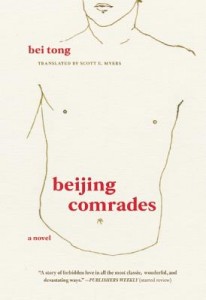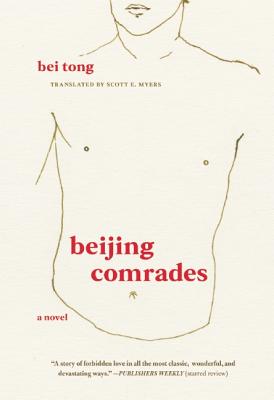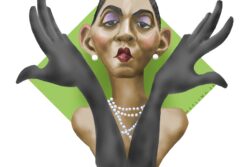 Beijing Comrades
Beijing Comrades
by Bei Tong
Translated by Scott E. Meyers
The Feminist Press. 371 pages, $16.95
ORIGINALLY PUBLISHED online in Chinese, Beijing Comrades is a first-person narrative with unadorned prose and vivid sex scenes. Set in the sociopolitical unrest at the end of the 20th century, China is steeped in social and economic change. However, old ways still dictate many aspects of urban life. For example, one does not marry out of his or her class. Parents pressure sons and daughters to marry, which is one of the conflicts that Chen Handong experiences in a country that views homosexuals as degenerates.
Handong is not a sympathetic character. He is self-centered, cruel, misogynistic, and mendacious. While he lives in Beijing, he has strong ties to his mother back in his provincial village. He visits her often and lies to her about the women he sees. In the city, he’s a wealthy businessman with a healthy sexual appetite who seems to have what he wants when he wants it, and that includes young boys. Handong expects to marry some day, and it’s not uncommon in his social circle for a man to keep boys; his friends do it, too. In due course Handong takes a sixteen-year-old male lover, Lan Yu, a boy from the provinces who came to Handong seeking a job. He’s a college architecture student and needs to supplement his income. Handong asks the boy to return the next day, hinting that there might be an opening. When Lan Yu returns, there is no job, but Handong has another plan. He seduces the boy, and here the reader is treated to the first of several male-to-male sex scenes. After some initial missteps, Handong sets the boy up in an apartment while he finishes college.
Handong does not think much of women, yet he doesn’t see that as a problem for his eventual life as a heterosexual. But his disdain for women is clear in what he says, such as: “The difference between men and women [is]when a woman has sex with you, it’s because of something you have—genius, money, or whatever, or because they want to find someone who will let them be a parasite forever. After women get what they want, they use sex as a way of rewarding men. … They’re just satisfying a primitive need.”
Actually, Handong is the one “satisfying a primitive need.” Sex is his main reason to be with anyone, and he makes that clear—to the reader, at least. In his own mind he’s not a homosexual, and he has promised his mother, as well as himself, that he will marry one day. Eventually, Handong gets involved with Lin Ping, a female interpreter who comes to his office with an American businessman. He finds her very attractive and starts seeing her, and, succumbing to maternal pressure, he marries her. At the same time, in an effort to rearrange his life to his advantage, Handong tries to persuade Lan Yu to see a psychiatrist to become “normal” again.
The marriage with Lin Ping, not surprisingly, turns out badly. Handong continually finds fault, especially with her spending, and his sexual desire for her wanes. When she learns of Lan Yu, she thinks he’s the cause of her failing marriage, so she informs Lan Yu’s employer and causes him to lose his job. The marriage to Lin Ping ends at that point. Next, because of some unexplained business mistakes, Handong goes to prison. When he comes out, he’s broke. By then Lan Yu has his own home and a good job, though he lives simply and happily. He has other men and is unapologetic about it. Gradually Handong’s gigantic ego is shrunken; he has nothing. He admits that he loves Lan Yu, but claims that “some things come too late.”
Beijing Comrades is set against a backdrop of cultural and political upheaval in China during the late 1980s and early ’90s. However, the events are never paramount to the characters’ lives, so readers seeking insight on recent Chinese history will be disappointed. Even the Tiananmen Square Massacre in 1989 is told secondhand. A translator’s note at the front and two postscripts following the novel are helpful in placing the action into historical context. On the other hand, readers seeking a gay male romance that borders on erotica should dive right in.
________________________________________________________
Martha Miller is a Midwestern writer of plays, novels, and short fiction. Her latest novel is Widow (Bold Strokes Books).






